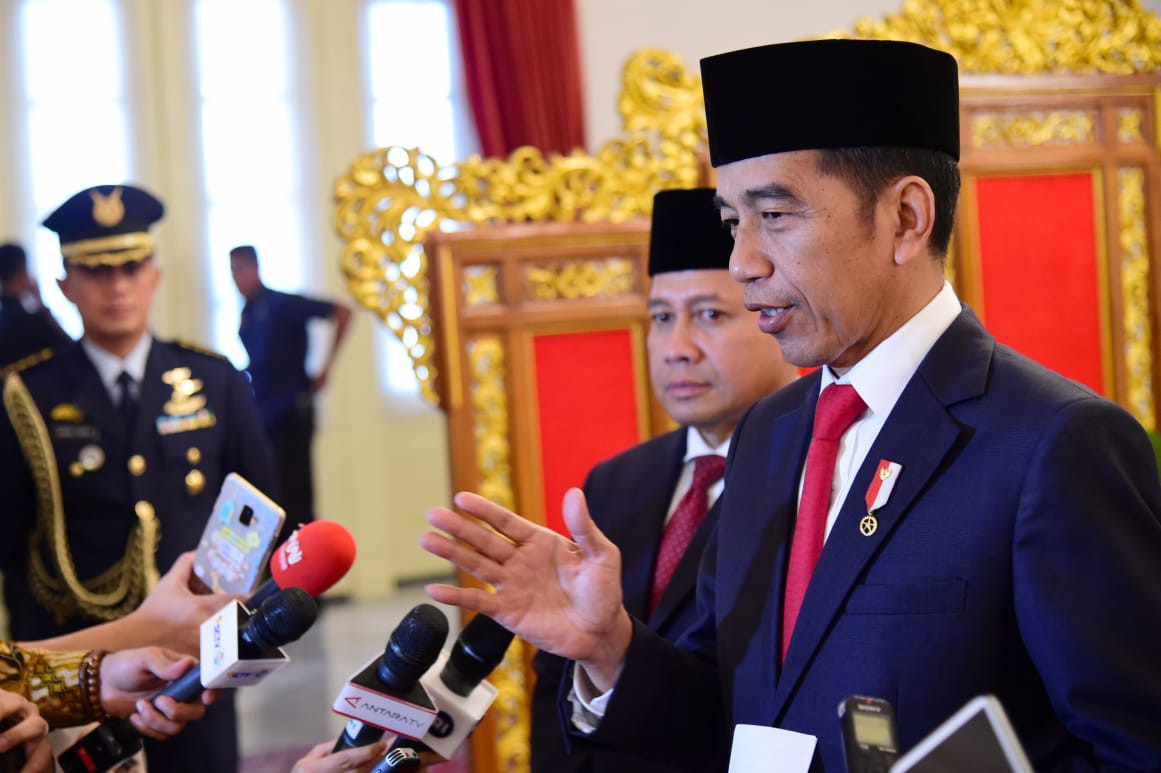Popular Reads
Top Results
Can't find what you're looking for?
View all search resultsPopular Reads
Top Results
Can't find what you're looking for?
View all search resultsOmnibus bill is Jokowi’s political gambit. And he may just pull it off
Jokowi has never spelled out clearly what legacy he wants to build for when he leaves the political stage in 2024, but the omnibus bill on job creation and what it means for the economy seems like a good bet.
Change text size
Gift Premium Articles
to Anyone
L
ike a professional chess player, President Joko “Jokowi” Widodo early in his second term in office has opened his move with a gambit: introducing a highly controversial bill on job creation that is already meeting stiff opposition, even from those who had helped him get reelected last April.
It’s a risky move that that could go either way.
This being his last term in office — the Constitution bars him from running again in 2024 — he has nothing to lose but his shirt.
Jokowi is doing exactly what many political observers tell presidents serving their last term: Without reelection worries, do whatever needs to be done, even if it is unpopular, and leave a legacy that people will remember you for.
Jokowi has never spelled out clearly what legacy he wants to build for when he leaves the political stage in 2024, but the omnibus bill on job creation and what it means for the economy seems like a good bet.
The government’s omnibus bill on job creation, a 1,028-page document now in the hands of the House of Representatives, has sparked fierce objections from many quarters, and there is a possibility that they may unravel Jokowi’s gambit, and with it, his legacy plan.
Labor unions, environmental activists and human rights and democracy activists — many of whom were loyal supporters of Jokowi going back to the 2014 and 2019 elections — are now campaigning to foil his move, either fighting against selected articles, or opposing the bill in its entirety.
Should they succeed, Jokowi would squander his second term, and like his predecessor, Susilo Bambang Yudhoyono, will leave no real legacy worthy of note in the country’s history books.
Although the job creation omnibus bill had been discussed in the political corridors for several months, the final draft submitted to the House last month took many people by surprise because of its enormity and the far reaching effects it would have if implemented.
Unions say it is antilabor, environmental activists say it would lead to more environmental degradation by industries and human rights activists are worried it would give overriding power to the president with little checks and balances. Even businesses, which helped write the draft, are concerned about some articles in the bill. Regional administrations are wary the bill would take away some of their autonomous power.
The bill, if passed, will revoke more than 1,000 articles in 80 laws, but then that is the rational for the “omnibus” label in the first place. Jokowi says reforming individual laws would take 50 years.
The idea behind the bill is that Indonesia needs to get out of the middle-income trap predicament in which annual economic growth rates have been struggling to stay above 5 percent.
Indonesia is in the middle of a demographic dividend era, when the size of the working-age population outstrips dependants. The country needs to create as many jobs as possible to turn this dividend into economic benefits.
Currently, the official unemployment rate is 5.3 percent of the 130 million-strong workforce, but this figure conceals the fact that as many as 40 percent are underemployed and vulnerable to being condemned to poverty when the economy slows down.
Jokowi knows that if he fails to bring in investment, he will not be able to create the number of jobs needed to absorb this ever growing workforce. He could go down in history as the president who squandered the demographic dividend, which will end in 2036.
Can he pull it off?
Politically, Jokowi today is at his most powerful since he became president in 2014.
He won a 55 percent mandate in the April presidential election and also brought his 2014 and 2019 contender, Prabowo Subianto, into his Cabinet. The ruling coalition of six political parties includes the three largest — the Indonesian Democratic Party of Struggle (PDI-P), Golkar and Prabowo’s Gerindra — and control 75 percent of House seats.
He has the support of conservative Muslims, who had been his Achilles heel, thanks to his new Vice President Ma’ruf Amin, a respected cleric from Nahdlatul Ulama, the country’s largest Islamic organization.
He counts on the support of business and is very much in command of the military and the police.
He turned his back on the more progressive segments of society, who had been his ardent supporters in the last two elections. But they have always been a minority, easily dispensable.
A survey by Indo Barometer last month on his first 100 days shows he commands a more than 70 percent public approval rating.
But Jokowi is far from being the lame duck final-term president many assumed he would be.
Many people have consistently underestimated Jokowi ever since he plunged into national politics in 2014. The former furniture salesman who began his political career as mayor of Surakarta, a small city in Central Java, has time again outsmarted his detractors and opponents, winning the Jakarta gubernatorial election in 2012, and the presidential elections in 2014 and 2019.
In the chess world, he could be a grandmaster of Indonesian politics.
This chess game, however, is far from over. Jokowi has made his gambit. Now it is up to anyone who cares to challenge him to make their move.










